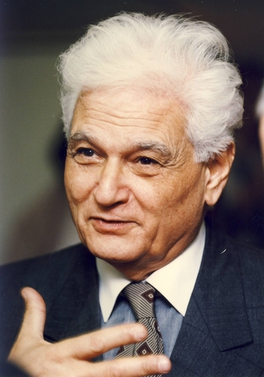Philosophy 101
- Introduction to Philosophy
- Ancient Greek Philosophy
- Renaissance and Enlightenment Philosophy
- Modern Philosophy
- American Philosophy
- Existentialism and Phenomenology
- Analytic Philosophy
- Contemporary and Postmodern Philosophy
- Eastern Philosophy
- Philosophy of Religion
- Philosophy of Science
Contemporary and Postmodern Philosophy
Deconstruction and Postmodernism: A Comprehensive Overview

Algerian-French philosopher (1930–2004).
In the realm of contemporary philosophy, two movements have had a profound impact on our understanding of language, culture, and society: Deconstruction and Postmodernism. This article aims to provide a comprehensive overview of these two philosophical movements, their key concepts, and their implications.
Deconstruction
Deconstruction is a philosophical and critical movement that emerged in the mid-20th century, primarily associated with the work of the French philosopher Jacques Derrida. It is a critique of the idea of logocentrism, or the tendency to privilege speech over writing in Western thought.
Key Concepts of Deconstruction
-
Différance: This is a French term coined by Derrida, which is a pun on the words "difference" and "defer". It suggests that meaning is not fixed but is constantly deferred, shifting in relation to other words.
-
Trace: In deconstruction, a trace is the mark of the absence of a presence, an always-already absent present. This concept is used to critique the idea of a pure origin or identity.
-
Critique of Binary Oppositions: Deconstruction often involves the decentering of binary oppositions like speech/writing, presence/absence, etc. It exposes how these pairs are not neutral, but hierarchically structured, privileging one term over the other.
Postmodernism
Postmodernism is a broad movement that developed in the mid- to late 20th century across philosophy, architecture, art, and criticism, marking a departure from modernism. Postmodern thinkers often reject grand narratives and ideologies, embracing complexity, contradiction, and ambiguity.
Key Concepts of Postmodernism
-
Hyperreality: This term, coined by Jean Baudrillard, refers to the inability to distinguish reality from a simulation of reality, particularly in technologically advanced postmodern societies.
-
Simulacrum: Also a concept from Baudrillard, a simulacrum is a copy without an original. It challenges the notion that an image must represent something real.
-
End of Grand Narratives: Jean-François Lyotard famously defined postmodernism as "incredulity towards metanarratives". This means a rejection of grand, totalizing theories or ideologies, in favor of local and specific narratives.
In conclusion, both deconstruction and postmodernism have significantly influenced contemporary thought, challenging our understanding of language, truth, and reality. They invite us to question our assumptions and to embrace complexity and ambiguity.